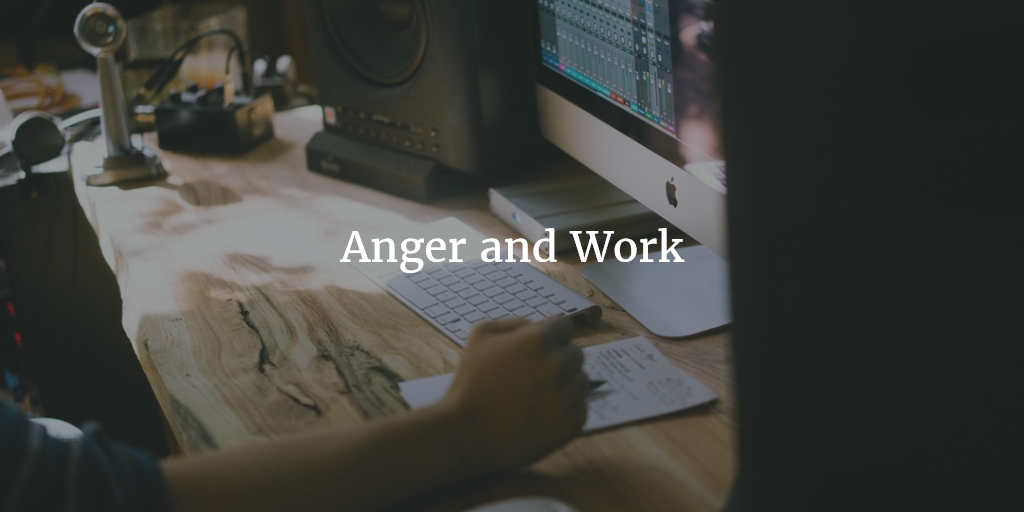
When we are persistently angry because of work, the effect on our lives is enormous. In this post, I will highlight some of the reasons why we can become angry at work. I will also emphasise the importance of recognising and acknowledging our anger.
We often don’t realise that we are angry because we believe that we are stressed, depressed, frustrated or simply incapable of doing our jobs. Recognising our anger can be the first step to becoming aware of our feelings and stopping the spiral of pain and destruction.
Why is work so important?
The workplace can occupy a very significant space in our lives. It can be welcoming and supportive and can help us to develop by exercising our capabilities of mind, body and spirit. We can feel fulfilled there. We work to earn a living but as we do we are building a life. Our work determines what that life will be.
It provides us with a role where we can contribute to the community and to society generally. It helps us to belong and, in many cases, it can be an area where we make friends. It is a place where we seek validation. Work can give us a sense of our own value, importance and ability.
Therefore, if we become unhappy in our jobs, if things go wrong for us in the workplace it can have a hugely detrimental effect on us.
Reasons why we become angry in the workplace
We can become angry with others because we feel that they have failed us in some way. Some examples might be that
– Our views are not considered;
– Our work has not been acknowledged, is taken for granted or is overlooked;
– We have been ignored or isolated;
– Others have failed to discharge their responsibilities leaving us with more responsibility.
The workplace can be a pressurised environment with calls from managers to meet targets or to satisfy customer demands. There can also be competition from fellow employees seeking recognition and approval. This can happen especially when there is a promotion at stake.
The threat of staff cutbacks in a firm is another unpleasant side of competition where employees vie with each other to save their jobs.
Competition is inevitable in the workplace but sometimes it can become hostile and bullying.
The above examples highlight some of the many ways that anger can appear at work. While some of us may acknowledge the anger. Others may feel that there is something wrong with us; that we don’t measure up in some way; that we are not good enough…. when in fact, we are angry.
The key to dealing with anger is to acknowledge it. When we examine our feelings of anger, it means that we try not to ignore or minimise the feeling and that we treat our anger as legitimate. It is then that we can realise that we are entitled to feel angry.
An honest examination of our feelings may tell us, for example, that when feel anger towards a boss or colleagues we may begin to realise that their behaviour is unacceptable and is bullying.
No entitlement to anger
We may feel we are not entitled to be angry so we feel empty and depressed. We can be reluctant to express our anger because we are afraid that we may damage others, or we may expose ourselves in some way and be riddled with shame afterwards. We may also feel that if we become angry that others (a boss, colleagues) will retaliate, hurt or humiliate us.
There can be a sense of shame about our feelings which in turn can increase our sense of isolation. We can feel like failures!
By shutting our anger down we punish ourselves and may suffer with illness and depression.
Anger with oneself
We can also feel angry with ourselves. Sometimes we set work goals for ourselves, e.g. promotion, that are very demanding. The achievement of these goals may be beyond our control.
When we do not meet targets we set ourselves then we can begin to question our ability. We may feel, for example, that we have chosen the wrong profession or that we should retrain in another area. These feelings may bring a sense of loss. We may feel that we would be better off in another job, that we made bad decisions when younger or that we were denied opportunities to study/train in an area where we could have flourished.
Our anger may hide feelings of inadequacy. It may remind us of feelings of inadequacy we held in childhood. When we can face these feelings, we are in a better position to move forward and take on fresh challenges in our lives.
The Workplace – Repeating Old Dramas
The workplace brings us into contact with people in many different contexts. In many ways, these relationships often resemble the dynamics of a family. Our bosses or managers may remind us of parental figures while our colleagues can be like siblings. So, without our awareness, the workplace can be a stage for a repetition of many of the dramas of our childhood. For example, an overbearing boss may feel like a demanding, strict father or, indeed, a domineering mother.
Feelings of anger may reveal a hidden pain that we have never acknowledged or been able to express. Once we become aware of and can articulate these feelings (even if it is only to articulate to ourselves) they no longer overwhelm us.
Anger is part of life. It is part of life in the workplace. Dealing with anger does not prevent it or eliminate it but does allow us to live our lives more fully.
If you would like to talk to me about any of the points mentioned here you can ring me at 085-7600123 or email me at paulcooney7@gmail.com.